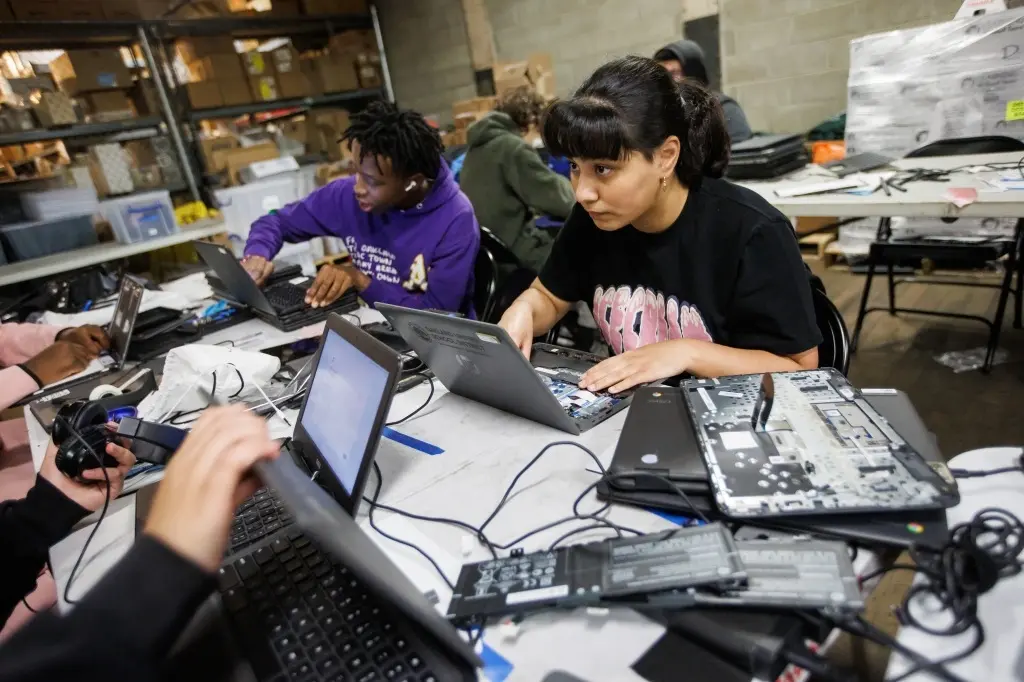There are few things quite as emblematic of late stage capitalism than the concept of “planned obsolescence”.
“These updates depend on many device-specific non-Google hardware and software providers that work with Google to provide the highest level of security and stability support,” said Peter Du, communications manager for ChromeOS. “For this reason, older Chrome devices cannot receive updates indefinitely to enable new OS and browser features.”
Bull. Shit.
I have an 8 year old iPad that can still use Amazon video and can still run Netflix, and google drops support for these computers as early as 3 years. I’m not an Apple fanboy but that is absolutely ridiculous.
Apple does the same thing if you don’t already have those installed
My 2nd gen Apple TV is garbage. Nearly all the apps fail to load now. 🤷♂️… I suppose I can try jailbreaking it but it sure feels like someone is trying to force me to upgrade my hardware.
That’s a product that hasn’t had an Apple update since 2014. What realistically do you expect hardware manufacturers to do with actually old hardware? Lose money supporting it forever? This is kind of the opposite case from the chromebooks.
I will give credit to Apple on that one because android phone manufacturers are now supporting their phone for longer because of how long Apple is supporting them.
I think the more probable reason is that EU regulators were unhappy with this for a long time and have now put 3 years of OS updates and 5 years of security updates into law. Low cost Android manufacturers don’t care what Apple does.
I remember back in the day when I had apple devices where they would push updates for devices long past their capability to actually run the updated software. Rather than refuse the update or get a pruned patch with security fixes only, it would force updates and bloat your phone and grind it into unresponsive unusability after a few years.
I hear that’s not so much the case anymore, so that’s nice. But I remember. The main reason I upgraded my phone was because of that, the hardware was great, but I could hardly use the software anymore even after clean installs.
My point being, I guess, extended support is great if managed properly but it can also become a bludgeon with which to drive you toward the new generations of devices.
long past their capability to actually run the updated software
Well, Apple intentionally slowed those devices down to make the users update, instead of using an insecure device, that would’ve provided a good experience otherwise.
And these days Apple is retiring devices arbitrarily for profits too. For example this year they are retiring the Iphone 8, which has better hardware, than the ipad 2018 that is still being supported…
That slowness was, at least officially, for the battery health. Do you have the support to prove otherwise?
And then if I recall correctly (though I can’t be bothered to look) didn’t they get sued for slowing phones?
So people were mad that their phones battery wasn’t holding a charge anymore, “im being forced to upgrade”, so Apple throttled older phones to keep the battery running, aka allowing people to keep their phones longer, and then they got sued for slowing down phones lol.
I am an apple fan boy, I wont hide that. But it does seem like they tried to do a “good” and make peoples phones last longer, and then got sued.
Also the whole forced upgrade just isn’t apples game IMO. Do they want you buying the new one every year, of course. But the more important thing is that you keep using AN iPhone at all. Stay in the ecosystem, stay in the app store, stay paying for icloud, etc.
Going to a new phone gives the user a window to move away from IOS. (Though most won’t haha)
These conversations bring the weirdest people out of the woodwork. I remember talking with a guy who explained to me how crap Apple laptops were because you (according to him) can’t customise them. Turns out he’d never owned or even used an Apple laptop. I was like, why do you care?! Especially about something you have no experience with!
But for their laptops the support has dropped to the lowest in years. Some intel MacBooks no longer get the latest version after 6 years.
Confused noise from people who grew up using Windows 95.
Huh? I have an ipad mini and since two-three years ago it’s as useful as a brick, Apple doesn’t allow me to install any app because they require a newer os version (that’s not available for the model)
By contrast my much older nexus 7 can still use most apps that I want
It can’t run everything obviously but the fact that my nearly 10 year old iPad can handle video streaming still and these schools have bricked laptops after 3 years is ridiculous.
Those Chromebooks aren’t bricked. They simply don’t get chrome updates anymore, even if it’s just Linux+Chrome and updates could continue forever without any real effort from Google
For security issues they can’t give to students unsupported hardware. The discontinued iPad would go in the same e-waste bin, because it’s not like android where browsers will continue to get updates for years and years
For a school they functionally are. They can’t use them if they can’t get security updates.
and instead the ipad that doesn’t get security updates since 2018 in your example doesn’t count?
Well for starters it wasn’t purchased by or for schools so no. But even if it was, it gets far more than 3 years of support. I think 5 is somewhat reasonable if we’re just going to accept this sort of behavior.
Either way the comparison is not really apt. Mobile devices are far worse about this than PC’s. You should instead compare a macbook (or a cheap windows machine), which gets security updates for 7-10 years. Google knows their devices are very popular for school computers, so to treat them like mobile devices and enforce the terrible standards that comes with is pernicious.
You’re also not a giant customer who needs security and it services like a school district. 3 years might be early, idk, but in plenty of enterprise or institutes replace their hardware every so often.
My 2012 laptop runs windows 10 perfectly fine and has the latest security updates. We’re way past the point of using hardware limitations as an excuse for companies to drop support early.
I don’t see why a school should have to replace their basic computers with an equally basic computer after 3 years unless it’s broken beyond repair. I don’t think the OS itself is doing much more than what an enterprise copy of windows does for security.
Funny you should say this. I have a 2012 Retina Macbook Pro, and yes it is running Windows or Linux with all the latest updates. However, Apple stopped supporting it in 2020. It’s too old for MacOS updates.
I’ve even seen a guide that will allow me to hack past the normal BIOS restrictions/allow me to put Windows 11 on it.
deleted by creator
has to be dumped
OpenCore Legacy Patcher, Linux, ChromeOS Flex, and maybe even Windows 10 could all be options for that Mac. As-is ot would still be perfectly safe to use offline too.
What year is the mini from? I run a Plex server off a 2010 Mac mini.
Apple devices are serviceable for far longer after the OS stops updating than windows/android devices in my experience. But regardless, Apple doesn’t discontinue support as early as 3 or 4 years. Even you have to admit that is ridiculous of google.
I have a 15 year old laptop that can still browse the web and play YouTube videos just fine because PC is a standardized platform with an open standard bootloader and a BIOS/UEFI system designed to abstract the hardware so the OS doesn’t have to be tailor-made to the hardware. Mobile devices are absolute shit in this regard. Why does the OS have to be specifically built to target one particular device?
It shouldn’t. End of question. This applies to Android, ChromeOS, and Apple devices equally.
I’m glad mobile Linux is starting to take off and there seem to be some standards emerging around ARM booting, even if it is still an absolute shit show compared to the standardization of UEFI/BIOS on x86/x86-64. I know some ARM systems can UEFI boot but it’s few and far between still so most devices still need a tailored kernel at least. That said, ARM Linux doesn’t need the entire freaking stack tailored to a device like Android and iOS do.
Couldn’t agree more. Every computer I have, no matter how old, can connect and do most things fine.
Weeell “bullshit” is easy to claim but not necessarily untrue. So with android phones this is definitely a problem. Industry wide firmware support for these ARM SOC-s are often ranging from not long enough, to fucking atrocious. You get basically two years of new drivers, and a security update maybe. The way LinageOS manages to support phones like the note 3, from like android 4, to 11, is basically creating manifests, that use drivers from newer, still supported, but “similar-ish” components. And the note 3 was a flagship device, easily the fastest phone of it’s generation. These Chromebooks, especially the ones schools can and do afford, are built to the penny. There is ultimately no point in pushing a software update to a device for a significant cost, that makes it so slow that no reasonable person would ever consider using it.
What is the solution to this? Hard to say. Not buying hardware so incredibly obsolete that it has to run an alternate OS, is a start. Maybe just use PC-s and deploy linux.
The solution is to let people use the device in any way they want and can. Software should not dictate hardware obsolescence.
If I’m reading this correctly (and you need to read between the lines a bit), it’s not that they literally don’t work, it’s that they aren’t capable of getting security updates. For playing Minecraft, who cares, but schools are legally obligated to keep private student information (like all their schoolwork) secure.
It’s not like there’s a LineageOS for Chromebooks and standardized firmware and drivers that can be easily deployed and updated. They mentioned in the article that open source alternatives were trialed, but that they lacked needed features and were very costly (in time, presumably) to get working.
This is just a shit sandwich all around.
From another perspective, several schools I’ve worked at have had so much vandalism and theft of Chromebooks that they won’t even consider replacing them with more costly future-proof tech. It doesn’t matter if they get 8 years of software support if students break most of them in years 1-3.
It’s not like there’s a LineageOS for Chromebooks and standardized firmware and drivers that can be easily deployed and updated. They mentioned in the article that open source alternatives were trialed, but that they lacked needed features and were very costly (in time, presumably) to get working.
You can run Linux on them, it’s the cost of getting a bunch of shitty ass chromebooks done that’s not worth it for schools.
This is exactly the issue for me. Devices used by 10-18 yo students do not last 10 years, and so it doesn’t matter if they get software support for that long.
My 12 y/o has gone through 3 Chromebooks since the pandemic, but they are $50 refurbished so who cares
Edit I have a gaming rig, and he uses the GeForce cloud gaming service on his Chromebook, and he loads into Fortnite faster than I do when we play duos
But they kinda sorta do. It is not like Chromebooks are locked down like an iPhone. I had an old Samsung Chromebook, you could just turn off trusted boot with a flick of a switch (okay it did reset your device), and just run what you wanted. It’s just with arm based stuff running what you want is not trivial. You run what you can which is often nothing.
Aren’t most Chromebooks out there Intel CPUs and essentially PC hardware? I know there are a few arm ones but it’s not most of them.
Fuck these Corporations, the only reason for this is to get the public school systems to constantly buy new chromebooks.
That’s what they should be doing, but it isn’t what they’re going to do, unfortunately.
Kimathi Bradford, a 16-year-old Oakland tech repair intern, has looked into whether there was a way to replace the outdated Chromebook software with a non-Google brand, but it ended up being a lot of work, Kimathi said, and the open-source replacement wasn’t up to par. “It’s like the Fritos of software,” he said. “No one really wants to use it.”
Now, I’m not sure if what they tried was Linux, but I wouldn’t be too surprised. The younger generations grew up with smartphones; I feel as though operating systems will become more streamlined and opaque as time goes on. I suspect we’ll have to contend with the phonification of mainstream computing in the coming years.
It’s not a sensible path for a school with budget constraints (which is most schools). They would need to come up with a new MDM solution because they can’t manage their computers with Google anymore. So their IT costs would increase dramatically, probably more money than they would save by keeping the old hardware alive. The simplest path forward is to just buy new Chromebooks.
I haven’t (will never) had the experience of owning chromebook as a student, what does the MDM will do here? Cheating prevention?
deleted by creator
I wonder what it would look like without these measures?
Back in My Day™, we had minimal MDM on the school computers.
Yes, the kids that wanted to fuck around (look at porn, download music, play games) fucked around, but they would have the old-fashioned way, anyway. The most common thing was just changing the desktop photo to a Lamborghini, or something. Anyway, we turned out…. Well… not necessarily ok, but I don’t fault the computers for lack thereof where applicable.
Admittedly, these weren’t personal laptops but just ones in the library or computer labs, but still.
Mobile Device Management, aka the administering of software to a fleet of devices.
Same thing it does for any instution that loans out hardware, e.g. employers:
-
monitoring
-
remote lockdown / wipe
-
remote management of installed software
-
etc.
-
As a lover of Frito pie, I take offense to this
I take offense to the idea that there is something called Frito pie, and worse, that your comment leads us to believe, hopefully errantly, that somebody has concocted such an abomination.
Why would you subject yourself to eating something that’s famous for smelling like the bacteria that festers between dogs’ toes: https://be.chewy.com/is-this-normal-why-do-my-dogs-feet-smell-like-fritos/
deleted by creator
Right, but then multiply that guide x1000 systems, losing google enterprise, switching over to a unix directory system, setting up infrastructure, network shares, printers, and everything and it’s not just a guide - it’s a team of people working for weeks to get it set up. Of course to us it’s easy, it’d just be a computer or two. To an entire company/school it may be over a million dollars to swap over
Agree. I’ve got a chromebook running Linux, for that I had to open it up and remove a screw. It takes around 15 minutes if you’ve done it before, so for bulk migration to Linux it’s not feasible.
You had to remove a screw to install Linux? Is that like a physical tampering prevention measure? Makes me think of how I had to swap a jumper to install a GPU in an old HP tower that had integrated video.
You’re saying it’s over a million dollars to revive some chromebooks? Or to build out a system that is independent from planned obsolescence? For a school district that has to operate in the long term, I think one of those is a bargain.
Also, the cost of maintaining 2 vs 1000 systems obviously scales up, but it’s obviously not nearly linear. The difference in cost between managing 1000 and 2000 systems would be negligible.
Right, for a huge enterprise they would probably honestly consider it, but a school with ~1000 students? Less? It’s going to be cheaper to trash those and get new ones. Don’t get me wrong I think it’s a terrible waste and Google is horrible for putting them in this situation, and I’d love for the open source community to offer some scripts for wiping, installing ubuntu, setting up ACLs, connecting to a domain, connecting shares, etc, but still most schools are going to see this and just say “Okay google how much money do you need for us to keep working?”
What kind of monster doesn’t like Fritos?
Sorry but Fritos of software is dumb & in no way representative of bringing old chromebooks back to life beyond their support date.
Schools often buy the bottom baseline of everything & in now way was a 4gb of ram a good, decent or proper experience to begin w/ & their replacements probably also had 4gb of ram - just a faster cpu, gpu & ram to hide that it’s lacking ram still.
I think schools could easily band together & make their own education focused Linux distro & then just focus on hardware that’s compatible w/ that’s Chromebooks or Windows laptops. Hard part would be building out an on par MDM &/or ldap server if not using a Windows server.
All Chromebook are is a browser basically. It already is the bag of Fritos imho. I think the hard part though would be to hire an IT guy that knows Linux better than the students tbh. Schools already under pay teachers in the US & that goes 2-3x for IT staff.
Yes!! Chromebooks have so much potential.
I have a cheapo 2016 acer Chromebook still going strong with Gallium OS. (An ubuntu based distro geared at low spec chromebooks.)
same article mentions Chromebooks are a great alternative to Raspberry Pis – cheaper and come with a built in keyboard and screen for monitoring all your automation needs …
deleted by creator
I, on the other hand, have a Lenovo Duet 2 which sort of sucked the day I bought it and has hardly gotten any better. I wanted a new Android tablet for taking notes and reading comics and there was just nothing else decent available a year ago. Specifically got an ARM one so it would reliably run Android apps. Which it doesn’t – it’s so unstable. Have to reboot it regularly when stuff stops working. The promise of Android apps on ChromeOS was more of a hope than a pledge.
Good thing it was cheap because this thing has practically no future for me. I regret everything about it.
deleted by creator
I love this, the idea that the hardware is done once the software gives out is asinine. It’s also what companies have been selling us on for decades now. It’s long past time to rethink the idea of what hardware lifespan really looks like
Companies making mass market devices should be required by law to support them indefinitely, or until they publish the technical specs sufficient for community support and repair.
The upgrade cycle they’re allowed to get away with today is not only a ridiculous drain on people’s money, but also a shameful source of pollution and waste.
until they publish the technical specs sufficient for community support and repair.
I want to see phones with no further official OS support have their boot loaders opened up so a lightweight OS can be installed on them instead. I’ve had iPhones in the past that have been absolutely rock solid after a battery replacement that lost iOS support, and with that a whole bunch of resale value. So I now tend to sell mine a year or so before they’re likely to be dropped.
But I genuinely think that I’d hold on to an iPhone that could have an alternative OS installed. This is, of course, why none of the major manufacturers allow this. Gotta put the profits ahead of the ethics.
Actually in the Android community Sony helps you unlock your bootloader and offers official AOSP sources for their devices that you can compile and install yourself.
I have no idea why people are enamored with Samsung.
Ad campaigns, most likely. I always seem to see ads for Samsung phones, but not as often for Sony brand ones. I do agree Sony does a much better job about opening up the bootloader, versus Samsung punishing you for trying to open your own paid for device up.
Exactly, bootloader locking should be downright illegal. If EU wants to make phones last, they need to mandate that you can unlock the bootloader (WITHOUT bullshit like having to get an unlock code from the manufacturer). Want to lock it down for certain software features like payments, etc? Ok, fine, I can live with that, so long as I can unlock it if I so choose and keep all HARDWARE functionality intact.
On another note, the manufacturers should be upstreaming and mainlining their drivers in the Linux kernel. ChromeOS and Android are both built on Linux, yet they keep all their hardware support in forks and branches that are left to wither and die rather than submitting those changes upstream. Only a select few ARM SoCs have mainline support. If the companies would just put a bit of extra effort into doing things right rather than the shitty hack jobs they do now to get products out the door as fast as possible, we could have a much better ecosystem around old phones. Of course, the shittiness is by design.
Anyone know where I can buy or place bids on batches/pallets/etc of them? I want to self host a bunch of shit using those cheap computers that are being thrown out.
Sourcing Chromebooks from the Reviving Chromebooks with Ubuntu I posted elsewhere
easiest looks like just calling the IT department of your local school
Interesting article, I don’t think I have a use for them though.
Same here!
I manage my schools IT - and when we started out a few years ago my board were pushing aggressively for Chromebooks. The service provider were talking about how they could roll out hundreds of Chromebooks at the touch of a button. When I asked about the lifespan of a Chromebook I got vague answers. I knew we would get a couple of years max out of each one so I instead pushed for much more expensive MacBooks. 5 years on and we are still using our original MacBook we got back then, with photoshop and other software.
Ironically the only way to use some old Macbooks these days is to put Chrome OS Flex on them. Apple is far more aggressive about killing off old hardware when it feels like it. You can still use them as-is of course but over time the browser and other web based apps degrade and refuse to work because of issues with TLS, CA certs (expired), discontinued backend APIs and unsupported web content APIs.
I have a 2015 fully specced 15" MacBook Pro that I’m trying to sell at the minute, which is proving more difficult than I thought it might, partly because the M-series Airs are so compelling, but also because it’s an incredibly powerful machine that’s officially locked to Monterey, which is now two years old.
Beyond Apple’s need for financial gains, I don’t think there was a compelling reason to leave that model out of the Ventura upgrades.
I had it running Ventura via OCLP, which it had absolutely no trouble with at all. But I can’t sell it in that state because while it’s pretty stable, there is still some extra fiddling needed with running an unsupported OS.
For me issues have only really started around the 5-8 years mark depending on the device which is ok-ish since the hardware is extremely outdated then anyway.
I’m curious how something like Framework laptops would pan out for this use case. New they are currently priced similarly to a macbook, but in theory they are indefinitely serviceable.
This is true! And you also don’t have to worry about the proprietary-ness of MacOS, and there are also (certain ways)[https://github.com/Gictorbit/photoshopCClinux] to get photoshop on Linux too.
Framework laptops are the exact opposite of what you’d want in a school environment. This is how you blow your schools IT budget out the window. Cheap, disposable, consistent configuration and manufacturer supported are the key concerns.
These are kids with various standards of computer literacy throwing them in their bags which they also kick around and treat pretty harshly all day long. A $4k Framework-style laptop is just silly.
Not necessarily! The Chromebook version starts at 1k, with a no-OS one 50 below that, both pre-assembled. Additionally, the higher build quality with the ease of part replacements would significantly reduce the load when it comes to repairs. The downsides of course are the high up-front cost, but this could be reduced by releasing in groups (by grade level, for example.) Also, an advantage with unrestricted devices like this is that it’s very easy to flash/install whatever you want, including whatever user permissions and applications are needed to ensure smooth operation (e.g. specific DNS/VPN configuration for content blocking or access to school materials.)
Either that, or I’m speaking out my ass. Still though, there’s a lower carbon footprint involved when you don’t need to huck the whole device in the trash once something breaks. That should at least be some kind of incentive…
You can buy 2-3 cheap Chromebooks for that which will theoretically last 10-15 years though for your $1k. Basically no schools are going to turn that up vs a $1k Framework most of which will not last half that long with kids using them.
Sucks for the environment though as you say, I wish it were different.
x86 Macs are not the greatest example of longevity at this point.
Not ideal that we had a percentage of our MacBooks on x86 cpus when the M1’s came out. But I will say they are still running strong. Others have pointed out that newer OS updates won’t work on the older MacBooks. But that’s not a deal breaker for us as we don’t run anything that’s OS specific enough to make the older models obsolete. We have factored in 5 - 7 years of use out of the laptops and we’re on course for that. I myself and using a 10 year old MacBook at home, and although I can’t fire up the latest Adobe Premiere on it, I can certainly get 99% of my work done on it.
This sounds like there’s a market for a Linux distro that behaves like ChromeOS and can be centrally managed.
The problem comes down to education institutions. I remember when we got Chromebooks in my highschool (8 years ago) admins forgot to turn of developer mode and half the school unenrolled the Chromebook managing to bypass all restrictions. This went on for half a year until one day our school needed to run a state exam (more for measure of schools performance not as a college entrance exam or anything).
The computerized testing program required deploying a specific chrome app accessible when chrome book is logged out (can’t just download from chrome web store). When they tried to push the client since half of Chromebooks were unenrolled it failed. This required the school it to recall pretty much all chrome books to manually re enroll all of them and disable developer mode (prevents unenrolling and prevents sideloading Linux).
Problem is if older Chromebooks are used for Linux in an educational environment there would be nothing stopping a student from whipping up a bootable USB and dumping another distro (bypassing restrictions). I’m also not sure if there is a enrollment mode equivalent Linux (there may be but not sure).
At least that’s my two cents (not a school it admin just a memory from the past 😉).
I never really understood the need for that strickt controll of the hardware… Who cares if Linux is sideloaded or if students unenroll. Imho I think if you need that strickt controll you are bound to get so many unnesseary issues down the line. Instead let student 6se what ever the fuck they want and for security just make sure they WiFi/ethernet is secure and locked down and any services the students need are behind a secure 2fa login. Treat any device as untrusted is more healthy for your security in the long run imo. If students need special software that they can’t run on their own machines you can lend them a machine for that specific task for a specific time. Problem solved.
I never really understood the need for that strickt controll of the hardware
Federal laws and rules for educational technology:
CIPPA - https://www.fcc.gov/consumers/guides/childrens-internet-protection-act
COPPA - https://www.ftc.gov/legal-library/browse/rules/childrens-online-privacy-protection-rule-coppa
and to an extent
FERPA - https://www2.ed.gov/policy/gen/guid/fpco/ferpa/index.html
still using things like Google Chrome or Chromebooks in 2023 is actually reckless behaviour. stuff like manifest v3 and the web integrity api just prove that google will use their monopoly to take over the open internet
Yes, why have we as a society allowed Google of all companies to take over something as important as public education? It’s downright dystopian.
Chromebooks expire? What the fuck? Are there logistical problems with installing Linux on these devices?
Chromebooks are unfortunately meant to be disposable like phones. Nobody should buy one, but unfortunately schools get them because they’re cheap.
On an individual basis you can install Linux, but for millions of devices thrown out by schools around the world, there’s no solution because the residual value is so tiny, you’d have to pay the techs minimum wage and hold a gun to their heads to get enough devices per hour to justify it.
I used to work at a refurb place and when we saw a chromebook that wasn’t immediately OK (it could’ve had a bad display or keyboard, or locked to an account), we just removed the eMMC, smashed the chip and threw the device on our scrap pallet.
Give them to the kids with a QR code guide sticker about installing Linux on them? I’m not a kid, but I would love if someone “threw” a couple of these in my general direction.
Almost certainly not allowed, schools are responsible for privacy and security on these devices.
I think its more that Google supports them for only so long and then they go bitrotten. The final update for these devices should also unlock the firmware so people can wipe the device and install Linux or something on it.
the Chromebooks with ARM processor (the majority of the cheaper ones) are notoriously known to be awful to install any alternative operating system
These things are such junk - even when new they were so slow and bloated that they couldn’t load my kid’s schoolwork half the time. I had to make sure he had an alternate laptop for use so he wouldn’t fall behind. I felt really bad for the school district, it was clear they were being ripped off, and that most of the machines were going to be in a landfill within 3 years time.
The article’s claiming the problem is planned-obsolete software, not inadequate hardware.
That’s their claim, but what’s in the old hardware?
Honestly people should stop buying Google products…
All of these machines make for decent Linux laptops. I picked up an EOL Chromebook for $35 last year and installed Debian on it. Decent little machine. Not terribly fast but very useable.
These are Linux laptops. But yes, they’ll work better if you put your preferred distro on them.
Good to know. Is it still a PITA to make the firmware let you change the OS?
Most modern ones it’s just commands you have to run. You can usually find an easy walk-though on the MrChromebox website. I haven’t seen one that required a jumper or anything in a LONG time.
Why are schools pushing so hard for enslaved Linux laptops?
Easier to manage for IT would certainly be my bet, and appealing cheap contracts. Even those Acer Aspires so many schools used were double the price of these Chromebooks, so suddenly youre talking about nearly halving a ~$100k cost. Schools want things locked down and enslaved, they couldn’t care less that they are Linux under the hood. They don’t think like you and I.
Yep, this is it. I volunteered for my school’s IT department in high school, this was basically the logic. The laptops are cheap and easy to manage/administrate. Whether or not they were Linux was a non-issue.
Edit: also, since chromeOS is basically just a browser, there wasn’t much that could break, and if something did break everything was stored in google drive anyway, so you could just factory reset the device and hand it back to the student without needing to buy any kind of higher-level support contract.
I’m currently in the market for something like a Chromebook but I’m not buying one because of stuff like this.
Lenovo yoga 11e, with linux. They’re like 250 bucks and a great value. Tablet mode too. I prefer mine to my better laptops, honestly, because I don’t have to worry about it at all.
If you want a fancy Chromebook, there’s the Framework Chromebook (or you could just get the regular Framework laptops)
Anyone got a non-paywalled version of the article?
Sorry! I didn’t realize it was paywalled because I could see the whole thing. Hopefully this should work:
If you are on ios device, using safari, tap the link and, you have to quick, tap the AA at the far left corner of the safari search (URL bar) while page is starting to load.
My 15 years old Linux laptop can still do everything (except gaming new titles)
Pffft… I can’t even get a laptop battery to last that long.

































